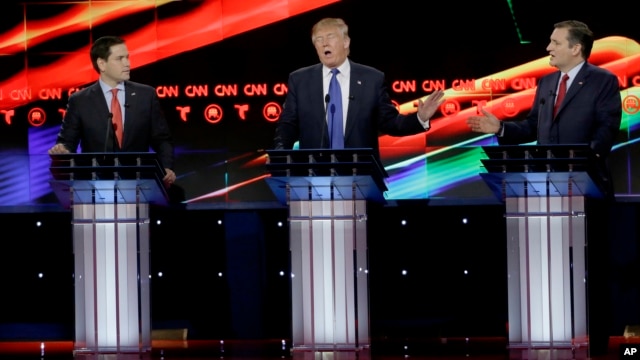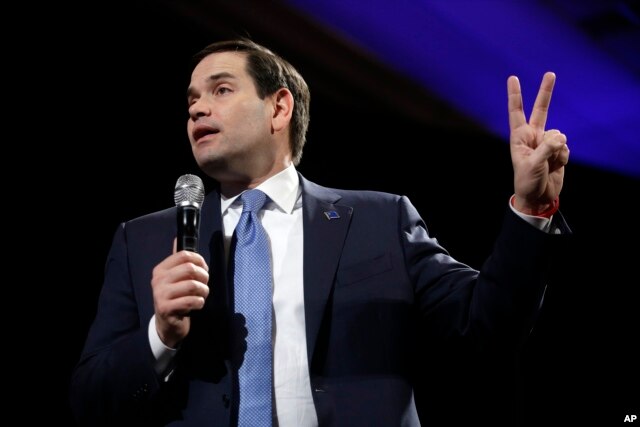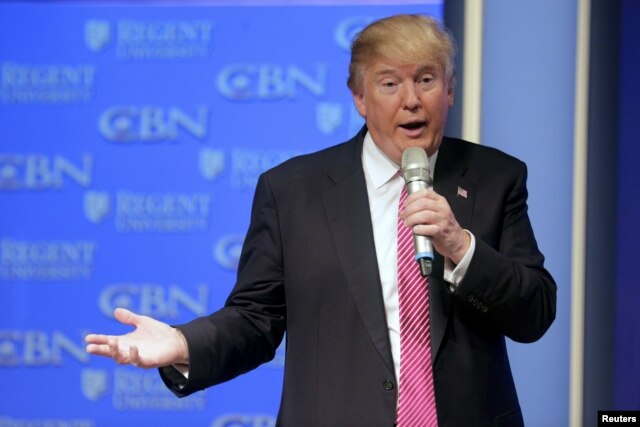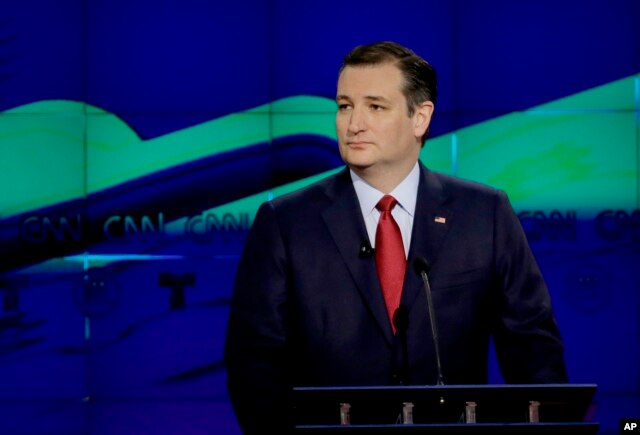Republican Candidates Squabble Over Immigration, Foreign Policy
Republican Candidates Squabble Over Immigration, Foreign Policy
Republican presidential candidate, businessman Donald Trump, center, reacts to Republican presidential candidate, Sen. Ted Cruz, R-Texas, right, as Republican presidential candidate, Sen. Marco Rubio, R-Fla., looks on during a Republican presidential prim
February 26, 2016 12:18 AM
The latest debate among Republican candidates for the U.S. presidency Thursday turned into a shouting match as the candidates tackled issues such as illegal immigration, U.S. policy in the Middle East and transparency of candidates' tax records.
Billionaire real estate mogul Donald Trump repeated his claim that he would make Mexico pay for the wall he has proposed building on the U.S. southern border to curb illegal immigration, and because of objections from Mexican leaders on the issue, he said, "the wall just got 10 feet higher."
His closest rivals, Florida Senator Marco Rubio and Texas Senator Ted Cruz, accused Trump of using illegal immigrant labor in some of his high-profile building projects. Both said Trump was forced to pay a $1 million fine for hiring illegal immigrants.
FILE - Republican presidential candidate Sen. Marco Rubio, R-Fla, speaks at a rally in Reno, Nevada, Feb. 22, 2016. Both Rubio and Cruz stated their willingness to make public their tax records and criticized Trump for demurring on the issue.
Both Rubio and Cruz stated their willingness to make public their tax records and criticized Trump for demurring on the issue. Trump said he would publish his tax records - a common practice for U.S. presidential candidates - only after what he called "a routine audit."
Answering a question on foreign policy, Trump said he would not support the cease-fire deal set to take place in Syria.
And he said he believes Libya, now embroiled in civil war, would have been better off if former leader Moammar Gadhafi were still in power. Gadhafi was ousted and killed during the Arab Spring movement of 2011 when Western powers backed a rebellion by the Libyan people against the Gadhafi government.
Trump blamed the rise of the militant group Islamic State on the downfall of Gadhafi and Iraqi President Saddam Hussein, who was deposed in 2003 and executed by his own people three years later.
Cruz, for his part, promised to "rip to shreds" the U.N.-brokered nuclear deal with Iran finalized in July of last year. The deal allows Iran relief from U.S., U.N. and European Union sanctions in exchange for the reduction or elimination of Iran's enriched uranium stockpiles and gas centrifuges.
The flamboyant Trump, who has never held elective office, has won three straight primary election contests in New Hampshire, South Carolina and Nevada. This debate precedes next Tuesday's party primaries and caucuses in 12 states, the single biggest day so far in the months-long, state-by-state races to pick both the Republican and Democratic party presidential candidates.
An online Bloomberg Politics poll released Thursday found the twice-divorced New Yorker Trump with 37 percent of the vote in seven southern states, home to some of the nation's most conservative voters.
FILE - U.S. Republican presidential candidate Donald Trump speaks at a campaign event at Regents University in Virginia Beach, Virginia. Recent polling showed Trump with 37 percent of the vote in seven southern states.
Attacks on Trump
Both Rubio and Cruz have sharpened their attacks on Trump in recent days, with Rubio contending that Trump's "Make America Great Again" campaign slogan is empty rhetoric without many specific policy proposals.
Two other candidates, Ohio Governor John Kasich and former neurosurgeon Ben Carson, remain in the race and were on the debate stage. The debate was the first without former Florida governor Jeb Bush, who dropped out after a disappointing fourth place finish last weekend in South Carolina.
Cruz, a conservative agitator in Washington against Republican and Democratic leaders, on Wednesday attacked Rubio and Trump as "Washington dealmakers." He said Rubio had collaborated with Democrats on immigration policy changes that Congress ultimately abandoned, while Trump has made campaign donations to Democrats in past elections and at times supported their policies.
Republican presidential candidate, Sen. Ted Cruz, R-Texas, looks on during a Republican presidential primary debate at The University of Houston, Thursday, Feb. 25, 2016.
Cruz is looking to win his home state of Texas on Tuesday and do well in other nearby states in the southern part of the country. But surveys show Republicans favoring Trump in those states and pulling close to Cruz in Texas. Rubio also faces a key contest in the southeastern state of Florida, his home state, on March 15, the same day Kasich is on the ballot with the other candidates in Ohio, the Midwestern state he governs.
Trump has predicted he will face off with former U.S. Secretary of State Hillary Clinton, the leading Democratic presidential contender, in November's national election to replace President Barack Obama, whose eight-year tenure in the White House ends in January.
Clinton has won two of the three Democratic state contests over her remaining rival, Vermont Senator Bernie Sanders, a self-described democratic socialist. Clinton, the country's top diplomat from 2009 to 2013, is favored in Saturday's primary election in the Atlantic coastal state of South Carolina and the two are battling in 11 states on Tuesday.





Comments